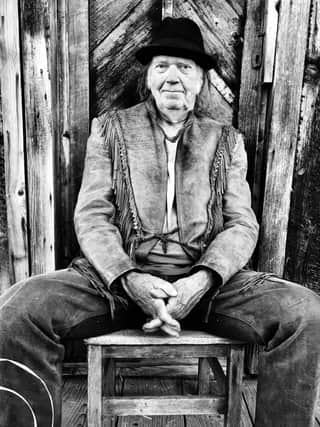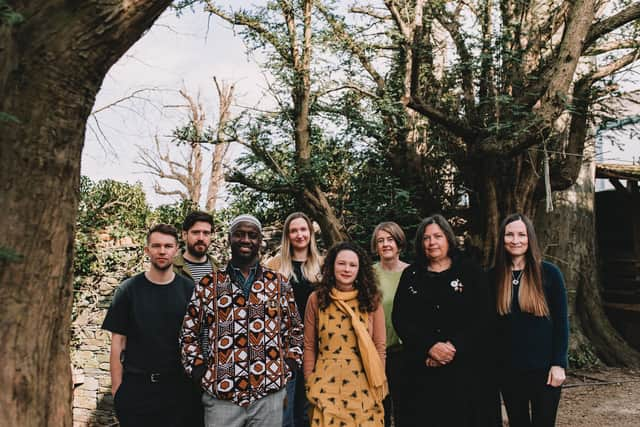Album reviews: Neil Young & Crazy Horse | Spell Songs | Crooked Timbers | Annie Booth


Neil Young & Crazy Horse: Barn (Reprise) ***
Spell Songs: Spell Songs II: Let the Light In (Thirty Tigers) ****
Crooked Timbers: On This Ocean (Velvet Coast Records) ****
Annie Booth: Lazybody (Last Night From Glasgow) ****
For decades, it felt that Neil Young was the lone musical prophet in the wilderness, railing against government corruption and environmental negligence. Why stop now that other voices have coalesced around him? Young’s 14th album with his compadres Crazy Horse – Nils Lofgren, Billy Talbot and Ralph Molina as things stand in 2021 – carries essentially the same sound and message as before, with a touch of pandemic piquancy.
Advertisement
Hide AdAdvertisement
Hide AdThis is their life-goes-on response to the trauma of the last two years (“masked people walking everywhere”) with Young and co living in the musical moment, eschewing all frills, distilling what matters to them, with seemingly little regard for the listener. Barn, recorded high in the Colorado mountains in the replica building of the title, is a live album in all but name, with no tinkering or finessing – and possibly no rehearsal.
The halting vocals and spontaneous harmonies of Song of the Seasons are somewhat arthritic but there is pathos in the immediacy and vulnerability on show, embellished by Young’s lonesome harmonica and Lofgren’s mellifluous accordion.


The quartet fire up the electricity on Heading West, before Young vents on the gnarled blues strut of Change Ain’t Never Gonna and provides some basic autobiography over a grit storm backing on Canerican. Next, he’s howling at the moon over his amour on the meandering blues of Shape of You, which may be similar in sentiment to the Ed Sheeran megahit of the same name, but is musically in a different galaxy.
Following the desolate limping lament They Might Be Lost and the ecogeddon of Human Race, featuring Crazy Horse as the Greek Chorus of doom, it is bittersweet relief to encounter the simple but comparatively elegant expression of Tumblin’ Through the Years, while acolytes of a Neil Young guitar odyssey may appreciate the eight-minute crotchety Crazy Horse epic Welcome Back.
If Karine Polwart, Rachel Newton, Seckou Keita, Julie Fowlis, Kris Drever, Beth Porter and Jim Molyneux sounds like your dream Celtic Connections line-up, you only have a month or so to wait, as their Spell Songs collaboration takes to the CC stage in support of their second album as an ensemble.
The project was initially inspired by two books, The Lost Words and The Lost Spells – the lyrical response of writer Robert Macfarlane and illustrator Jackie Morris to nature words being dropped from the standard Children’s English Dictionary based on lack of everyday usage.


Let the Light In sanctifies these words as song titles – Bramble, Swallow, Jay, Gorse, Silver Birch – and treats them with the utmost sonic care. Oak is as graceful and mighty as its subject, with Drever leading a Laurel Canyonesque harmony ensemble. Porter teams winsome ukulele with swooning female backing vocals on Daisy, while Keita’s kora provides the undulating pulse on Thrift (Dig In, Dig In).
Advertisement
Hide AdAdvertisement
Hide AdCrooked Timbers is another collective effort, this one forged with wit and soul by Orange Juice guitarist James Kirk and Del Amitri keyboard player Andy Alston, drawing on their musical associates from Glasgow and beyond. Frank Reader of Trashcan Sinatras steers the wistful pop romanticism of Good Ship, Ken McCluskey delivers some Glaswegian gospel on Streetlights and Monica Queen is on breathy form on an alluring debut.
There is an engaging and unvarnished quality to Edinburgh singer/songwriter Annie Booth’s music, delivered straight from her mouth to your room, with a little help from Catholic Action frontman Chris McCrory on production. Containing meditations on dementia and the intoxicating pull of London, her second album Lazybody ranges from the timeless folk pop songwriting of Nowhere via the luxurious languor of Tropic to the raw folk picking of Fallow Year.
CLASSICAL
Florence Price: Symphony No 3 (Naxos) ****
There’s a wonderful free-spiritedness in the music of Florence Price (1887-1953) that is at odds with the relative indifference, and no doubt prejudice, she witnessed as an African-American woman in the first half of the 20th century. Only now are we beginning to hear performances of her considerable output, including this glowing recording of the 1940 Symphony No 3 (she wrote four) by the ORF Vienna Radio Symphony Orchestra. This is sumptuous music, freely inventive, with inspirations from modernist whole-tone harmonies and homely echoes of Dvorak to ebullient use of jazz and nostalgic allusions to the American spiritual. Price combines these with a technical ease and virtuosity that would have gone down well in Golden Age Hollywood. John Jeter conducts warm-hearted performances of this and two orchestral suites: The Mississippi River; and Price’s trenchant response to the American experience of enslaved Africans, Ethiopia’s Shadow in America. Ken Walton
FOLK
Fourth Moon: Odyssey (Own Label) ****
This second album from the pan-European grouping of Scots Border accordionist Andrew Waite, Austrian flautist Géza Frank, Italian fiddler David Lombardi and French guitarist Jean Damei, plus occasional vocals from Ainsley Hamill, energetically transcends the pandemic that has curtailed their collaboration. Their cosmopolitan and vividly textured neo-trad music, generally self-composed, combines deft touch with infectious drive, as in the introductory Open Seas set, its flowing reels suddenly snapping into nimble jig time. Elsewhere, there’s a spacy, echoing drift to Borealis, whistle dancing over pizzicato strings, and Zenith, with its shrilling fiddle, while the Marine Clean set demonstrates the band’s knack of building up a jubilant climax, with guest drummer Michael Shimmin helping out in the closing track. Two rather isolated vocal interludes come from the velvet-toned Hamill, who contributes Gaelic puirt à beul and a dramatically accompanied rendition of the venerable Elf Knight ballad. Jim Gilchrist
A message from the Editor
Thank you for reading this article. We're more reliant on your support than ever as the shift in consumer habits brought about by coronavirus impacts our advertisers.
If you haven't already, please consider supporting our trusted, fact-checked journalism by taking out a digital subscription at https://www.scotsman.com/subscriptions